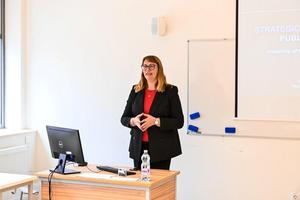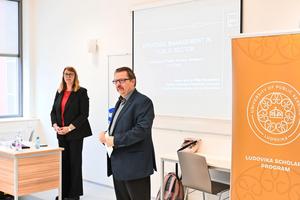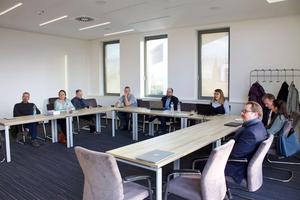In the framework of the Ludovika Scholars Program, Ruta Petrauskiene, associate professor at Kaunas University of Technology in Lithuania, a renowned researcher and expert in strategic public management and methodological issues, especially design thinking, gave a public lecture and a specialised workshop at the Faculty of Public Governance and International Studies of Ludovika University of Public Service.
In her public lecture, Ruta Petrauskiene tried to find the difference between public and private organisations with the students and then discussed the need for a comprehensive reform of the public sector, which is inevitable due to the crisis of the welfare state, which implies a new basis for governance. The main question was whether the adaptation of tools and methods (privatisation, contracting out, competitive tendering, performance measurement, etc.) used in the private sector could remedy the failures of traditional public administration. Professor Petrauskiene then went on to show that modern public management today offers a range of tools and methods that can be used to achieve the objective with greater efficiency and less effort. In particular, she spoke about the elements of strategic management, which is the process of achieving long-term objectives through strategic actions defined in relation to organisational capabilities and the environment. To this end, she especially pointed out the ability to define the mission and the vision to be achieved, to analyse the external and internal situation, to draw up a strategic plan with the appropriate actions and policies, to implement and execute them and, finally, to monitor their implementation and compare the objectives and results achieved. The theoretical framework was illustrated by a number of practical examples from the Lithuanian public
administration.
In the framework of the Ludovika Scholars Programme, the Department of Governance and Public Policy then organised a workshop, “Complexity of Public Policy or a Public Policy of Complexity? Design Thinking as a Framework of Identifying, Examining and Addressing Wicked Problems”. The workshop focused on issues related to the nature, analysis and management of possible solutions to complex or, as it is often called in the literature, “wicked” problems. The topicality of the subject, in addition to the ubiquity of complex problems, is also demonstrated by the fact that just half a century ago, in 1973, Melvin Rittel and Horst Webber's iconic paper (Dilemmas a general theory of planning) became the seminal work for exploring and understanding the possibilities of dealing with ill-defined, symbiotic problems that can only be treated with relative and short-term solutions.
Following a welcome address by Dr. Péter Krisztián Zachar, Vice-Dean of the Faculty for International Affairs, Dr. Tamás Kaiser, Head of the Department, introduced and moderated the workshop. Professor Petrauskaine discussed how design thinking methodology can be applied to the management of complex problems. She found that the multi-stage design and analysis methodology is useful in that an iterative problem mapping, based on stakeholder involvement, contributes to the identification of possible solutions and is suitable for focus group testing of the developed action models and redesign of any flawed elements.
Afterwards, the invited speakers (Natalia Ermasova, Fulbright Professor at the Faculty, Dóra Lipták Senior Consultant at IFUA Horváth&Horváth Partners Ltd, Dr Tamás Tóth, Methodological Expert from the Office for Science Strategy, and the Department's colleagues, Associate Professors Dr Márton Gellén and Dr Antal Szerletics, and Assistant Professor Dr Csaba Máté Szabó, re?ected on the presentations. Among other things, it was pointed out that in solving a problem which is otherwise thoroughly assessed, the chosen solution alternative can often only be implemented by rejecting another one (trade-off effect) and that not all complex problems can be considered “wicked”, since under certain conditions sustainable and viable solutions can be found even in the longer term. In her concluding remarks, Ruta Petrauskaine underlined that stakeholder analysis plays an important role in understanding the conditions of complex issues and is an essential element in the application of design thinking.
Text: International Division, FPGIS, LUPS
Photos by András Szabó, Dénes Szilágyi
Tags: FPGIS Ludovika Scholars LUPS




